|
|
|
Sort Order |
|
|
|
Items / Page
|
|
|
|
|
|
|
| Srl | Item |
| 1 |
ID:
159465
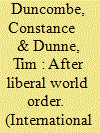

|
|
|
|
|
| Summary/Abstract |
In recent years claims about the end times of the liberal world order have gathered force, with the talk of order giving way to disruption. While there are different accounts of these disruptive dynamics and their causes, it is nevertheless a rare moment in International Relations when all mainstream theories concur that the hegemony of the liberal world order is over and that there is considerable uncertainty about the global architecture that will take its place. Yet claiming that the liberal world order is in trouble is just a starting-point—a deeper account is needed to show how each interrelated element ‘hangs together’. We examine two interrelated patterns to liberal world ordering—internationalism and imperialism. After unpacking each of these interrelated ideas which constitute liberal world order, the narrative will focus on the politics and practice of humanitarianism. Humanitarianism is, of course, deeply intertwined with liberal assumptions about an ethic of care for peoples who are either at risk of, or worse still suffering from, large-scale natural disasters and politically-induced atrocities. Our inference is that the condition of humanitarianism provides a good indication of the state of the liberal world order—its limits and possibilities.
|
|
|
|
|
|
|
|
|
|
|
|
|
|
|
|
| 2 |
ID:
159464
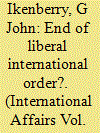

|
|
|
|
|
| Summary/Abstract |
These are not happy times for liberal internationalists. No one can be sure how deep the crisis of liberal internationalism runs. However, in what follows, I argue that despite its troubles, liberal internationalism still has a future. The nature of the crisis is surprising. The threats to liberal internationalism were expected to come from rising non-western states seeking to undermine or overturn the postwar order. In the face of hostile, revisionist states, the United States and Europe were expected to stand shoulder to shoulder to protect the gains from 70 years of cooperation. But, in fact, liberal internationalism is more deeply threatened by developments within the West itself. The centrist and progressive coalitions that lay behind the postwar liberal order have weakened. Liberal democracy itself appears fragile and polarized, vulnerable to far right populism and backlash politics. In recent decades, the working and middle classes in advanced industrial democracies—the original constituencies and beneficiaries of an open and cooperative international order—have faced rising economic inequality and stagnation. Within the West, liberal internationalism is increasingly seen, not as a source of stability and solidarity among like-minded states, but as a global playing field for the wealthy and influential. Liberal internationalism has lost its connection to the pursuit of social and economic advancement within western countries.
|
|
|
|
|
|
|
|
|
|
|
|
|
|
|
|
| 3 |
ID:
159467
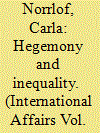

|
|
|
|
|
| Summary/Abstract |
A pivotal question raised in the 1980s debate over the durability of the United States-led world order still haunts us today. Does the postwar liberal international order, which the US was central in shaping, serve US interests? President Trump's answer is a resounding no, promising an ambitious redistributive programme to rebalance global wealth and power. Similar to political platforms in other advanced countries, Trump argues for a fundamental revision of the order, proposing a renewal of international principles to foster a global system tailored to US interests. The major theatres where this battle is being fought are the politics of security, trade and money. Prominent academics align on some aspects of this agenda. Instead, I contend that as the primary beneficiary of the liberal international order, the US will be its first casualty. While President Trump is right to identify the potential role redistribution could play in strengthening America's global leadership, he misidentifies the nature of the distribution problem. Internationally, ‘America First’ is premised on zero-sum logic and poses a risk to the liberal international order, to US security and prosperity. Domestically, ‘white America First’ promises to restore lost greatness to white Americans, aggravating economic and political inequality in the US. Drawing on presidential exit polls, other survey data, real income and income growth nationally and regionally, I explain the 2016 election outcome as a function of education and ethnicity, contextualized by income concerns and racism. Redistributive domestic policies, particularly expanding higher education, are necessary for US support of the liberal international order to endure.
|
|
|
|
|
|
|
|
|
|
|
|
|
|
|
|
| 4 |
ID:
159463
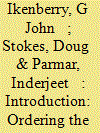

|
|
|
|
|
| Summary/Abstract |
The Trump presidency appears to personify, along with Britain's vote to withdraw from the European Union, a sense of deep crisis in the United States-led liberal international order (LIO). The two states that conceived and constructed a whole array of international institutions after 1945 now seem to be rejecting that order, or at the very least, demanding that its institutions either be reformed or recalibrated to better suit their purposes. However, both developments may signal a new phase in the evolution of the international system—more nationalistic, state-centric and transactional, in which costs and responsibilities are more widely shared and where the electorate questions the costs versus benefits of the postwar liberal consensus. This crisis has long been evident
|
|
|
|
|
|
|
|
|
|
|
|
|
|
|
|
| 5 |
ID:
159466


|
|
|
|
|
| Summary/Abstract |
Liberal internationalism has been in crisis for a while now. Yet, until recently, its supporters have argued that its prospects are better than ever, as the successful spread of liberal principles, practices and institutions in the international sphere provides the necessary basis for reform. Alas, recent political developments do not support these expectations. In fact, the Brexit vote, the election of President Trump, and the rise of populism more generally challenge liberalism in the domestic sphere and aim to unravel its international achievements. But the idea that these movements are therefore liberalism's nemeses does not quite follow. Providing a theoretical and historical analysis of liberalism, this article shows that the separation of domestic and international politics is constitutive of liberalism itself. The successful extension of liberal principles into the international sphere undermines this separation and thus liberalism itself. Ironically, therefore, the prospects of liberal internationalism are dependent on the reestablishment of a clear divide between domestic and international politics. And this, I argue, is precisely the goal of contemporary populist movements.
|
|
|
|
|
|
|
|
|
|
|
|
|
|
|
|
| 6 |
ID:
159470
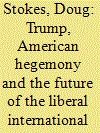

|
|
|
|
|
| Summary/Abstract |
Through its ambivalence towards its global security alliances, abrogation of free trade treaties and questioning of globalization, the Trump administration has argued that the United States-led liberal international order is too burdensome. How accurate is this portrayal? Drawing on theories of hegemonic leadership, the paper argues that the US national interest became globalized in the postwar international system and the US-led liberal order has given it enormous positional advantages. These include the capacity to shape the international preferences of other states, externalize domestic economic crises and construct the kind of international economy it wanted. Despite growing international competition, the US still has essentially the same global interests. However, neo-liberal globalization has weakened the domestic consent for American leadership among large sections of the American working class, who have rationally rejected continued US commitment to a system that has deepened economic inequality in the US. Trump has ridden the wave of this discontent, and although US elites may wish to return to the status quo after President Trump, these structural issues will remain. Trump may well do irreparable damage to the liberal order and thus, more broadly, to the West. While imperfect, the liberal order is still the ‘best of a bad bunch’ in terms of forms of systemic order on offer, and if the luxury of choice remains after Trump, a new domestic and international social contract is needed to revive US global leadership.
|
|
|
|
|
|
|
|
|
|
|
|
|
|
|
|
| 7 |
ID:
159469
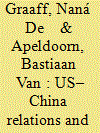

|
|
|
|
|
| Summary/Abstract |
The future of liberal internationalism will be influenced increasingly by the re-emergence of China as a major power on the world stage and by the way the United States is reacting to China's growing influence. In this article, we discern three possible scenarios: one of inevitable conflict, one of gradual co-optation and a hybrid scenario of coexistence. We argue that in order to understand the development of the Sino-US relationship and the sometimes-contradictory outcomes and dilemmas this generates, we need to take into account the social and domestic sources of foreign policy within these two major powers, and the distinctive state–society models that they represent. Crucially, this includes how the domestic political economy is dynamically interrelated with the global political economic context. In our approach, foreign policy elites form a key nexus here and a vital prism through which to analyse foreign policy strategies. From this critical political economy perspective, we will describe how China's re-emergence as a world power is partly shaped by its distinctive ‘statist’ state–society model, to then analyse US strategy towards rising China through the lens of the close nexus between America's corporate elite and the state. In our concluding section we will return to the three scenarios. Based on the findings presented, and in light of the radical shift that seems to be occurring due to the Trump presidency, we will reflect on the likelihood of these scenarios, the future of the liberal world order and conclude with a research agenda.
|
|
|
|
|
|
|
|
|
|
|
|
|
|
|
|
| 8 |
ID:
159468
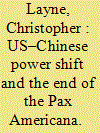

|
|
|
|
|
| Summary/Abstract |
In this article, I show that far from consenting to be bound by institutions and rules of the Pax Americana, China is already working to recast the international order in ways that favour its interests, not those of the United States. The US foreign policy establishment does not grasp this, and, instead, has invested the idea of a ‘rules-based, institutionalized’ international order with a talismanic quality. It claims that rules and institutions are politically neutral, and, ipso facto, beneficial for all. However, in international politics, who rules makes the rules. Rules and institutions reflect the distribution of power in the international system. A power transition is taking place in the early twenty-first century: US power is in relative decline and China is rising quickly. No international order—not even the Pax Americana—lasts forever. The liberal world order cannot survive the erosion of US hegemonic power. It is this structural change, not Donald Trump, that threatens the post-Second Word War international order's survival. It requires a huge leap of faith to believe that a risen China will continue to subordinate itself to the Pax Americana.
|
|
|
|
|
|
|
|
|
|
|
|
|
|
|
|
| 9 |
ID:
159471


|
|
|
|
|
| Summary/Abstract |
This article argues that the biggest challenges facing the post-1945 liberal international order are the need to genuinely embrace ethno-racial diversity and to reduce class-based inequalities. However, this is problematic because the liberal international order's core foundational principles, and principal underpinning ‘theory’ (liberal internationalism), are Eurocentric, elitist and resistant to change. Those core principles are subliminally racialized, elitist and imperial. They are embedded in post-1945 international institutions, elite mindsets, and in the institutions of the US foreign policy establishment—which are seeking to incorporate emerging power elites, willingly, into the US-led order. As illustration, this article considers examples that bookend the US-led system: wartime elite planning for global leadership; the role of the United Nations in Korea from 1945 to 1953, where it served as the primary instrument for the creation and incorporation of (South) Korea into the US-led order; and several US state-linked initiatives in China over the past several decades, including the Ford Foundation. The article compares the contemporary and historical evidence to liberal internationalist claims, as well as to claims implied by work on ‘ultra-imperialism’, based on Karl Kautsky's and Antonio Gramsci's ideas of hegemony. The article concludes that elite incorporation—by a combination of coercion, attraction and socialization—is the principal goal of the US-led order, as opposed to embracing diversity and moving towards genuine change felt at a mass level. Hence, we should expect domestic and international political crises to deepen.
|
|
|
|
|
|
|
|
|
|
|
|
|
|
|
|
|
|
|
|
|